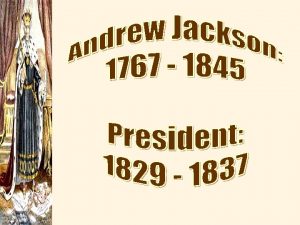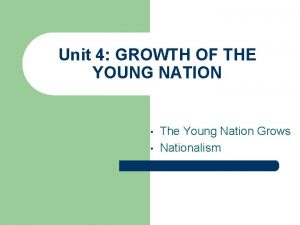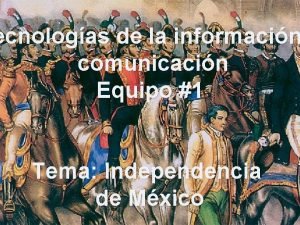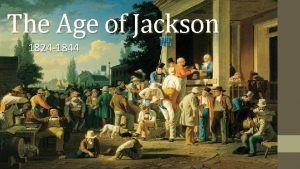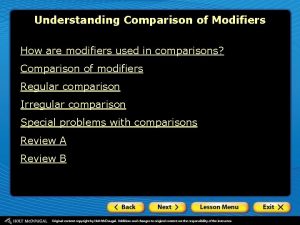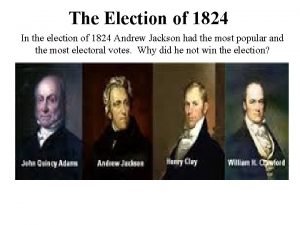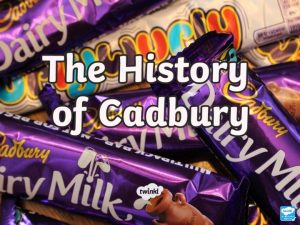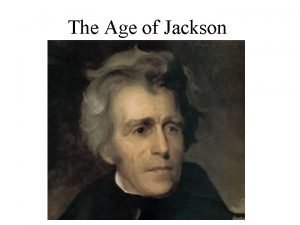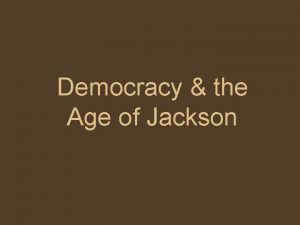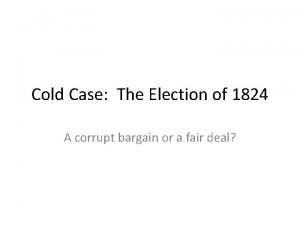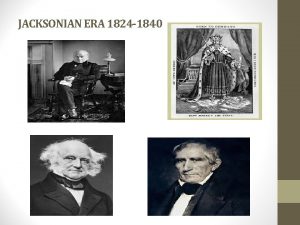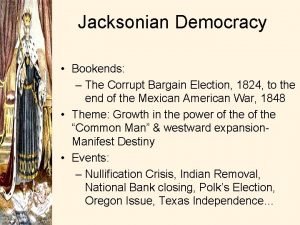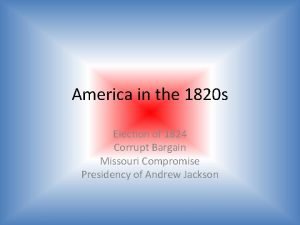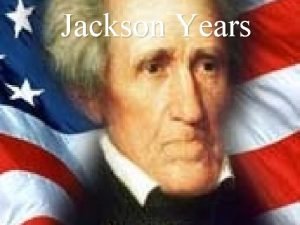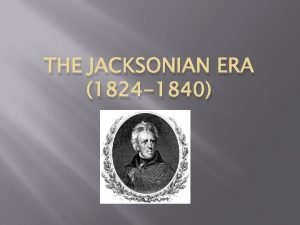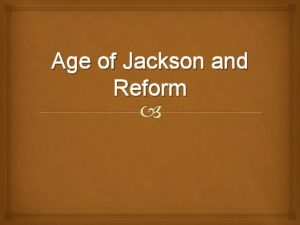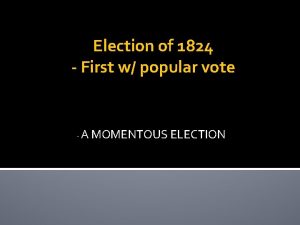Election of 1824 The Election of 1824 clearly


















- Slides: 18

Election of 1824

The Election of 1824 clearly showed that the "era of good feelings" had come to an end. n All the candidates were in the same party, Democratic-Republicans, but personal and sectional interests outweighed political orthodoxy. n

You are about to meet the 4 candidates that ran for President in 1824 Andrew Jackson n William Crawford n John Quincy-Adams n Henry Clay n

Andrew Jackson n Andrew Jackson, a Senator from Tennessee and military hero, drew Western support from Clay despite the fact that his political views were not well-known.

William H. Crawford n William H. Crawford of Georgia was born in Virginia and hoped to continue the "Virginia Dynasty; " he held to the old-line Republican view of limiting the role of the central government, but was still the congressional power brokers' favorite.

John Quincy Adams John Quincy Adams, son of a Federalist president, represented the interests of the Northeast (high protective tariff) and was the leading contender

Henry Clay, Jr. n Henry Clay of Kentucky shared political views with Adams, but they held one another in contempt — the rigid New Englander versus the hard-drinking Westerner

John C. Calhoun of South Carolina harbored presidential aspirations, but backed out in the hope of securing the vice presidency.

Election of 1824 Adams Jackson Clay Crawford Others 9

When results were tallied it was evident that Clay had siphoned-off enough votes from Adams to deny him an electoral majority. n Adams finished with 84 votes, Jackson 99, Crawford 41 and Clay 37. n

Election of 1824 Candidate Electoral Vote Popular Vote Democratic. Republican 84 115, 696 Henry Clay (KY) " 37 47, 136 Andrew Jackson (TN) " 99 152, 933 William H. Crawford (GA) " 41 46, 979 John C. Calhoun (SC) " 182 Nathan Sanford (NY) " 30 Nathaniel Macon (NC) " 24 Andrew Jackson (TN) " 13 Martin Van Buren (NY) " 9 Henry Clay (KY) " 2 Party Presidential John Quincy Adams (MA) Vice Presidential Votes not cast 1

n The Twelfth Amendment (adopted in 1804 following the disputed Election of 1800) provided that elections in which no candidate received a majority should be decided by the House of Representatives from among the top three candidates. Clay was out of contention and Crawford was an unlikely prospect because of a serious illness.

n The Twelfth Amendment (adopted in 1804 following the disputed Election of 1800) provided that elections in which no candidate received a majority should be decided by the House of Representatives from among the top three candidates. Clay was out of contention and Crawford was an unlikely prospect because of a serious illness.

Jackson clearly expected to win, figuring that the House would act to confirm his strong showing. n However, Clay, as Speaker of the House, used his influence to sway the vote to Adams. Although they were not close, Clay knew that he and Adams shared a common political philosophy; n

Clay also knew that Jackson was an avowed opponent of the Bank of the United States, a vital component of the American System. n Clay also was not interested in doing anything to further the career of the hero of New Orleans, his main rival in the West. n

Adams prevailed on the first ballot in the House of Representatives and became the nation's sixth president. n His subsequent appointment of Henry Clay as Secretary of State led to angry charges of a "corrupt bargain. " n

Adams Administration • Refused to Use the Spoils System • Strong Nationalist • Recommended Nat’l University, Nat’l Observatory, Fed. Funding of Internal improvements 17

Election of 1828 Jackson Andrew Jackson (Jacksonian Democrats) John Q. Adams (National Republicans) 18
 Hume foreclosures
Hume foreclosures Was andrew jackson a president
Was andrew jackson a president Martin van buren political party
Martin van buren political party 19 estados y 5 territorios de méxico en 1824
19 estados y 5 territorios de méxico en 1824 Guided reading & analysis: the age of jackson, 1824-1844
Guided reading & analysis: the age of jackson, 1824-1844 Jim bowie
Jim bowie Constituição 1824
Constituição 1824 The age of jackson 1824-1844
The age of jackson 1824-1844 The romantic age (1798 to 1824)
The romantic age (1798 to 1824) The romantic age (1798 to 1824)
The romantic age (1798 to 1824) Austin
Austin Accenture delivery suite (ads) support?
Accenture delivery suite (ads) support? Expressing your views clearly and respectfully
Expressing your views clearly and respectfully Eye can see clearly now
Eye can see clearly now Two closed pyramid shaped beakers containing clearly
Two closed pyramid shaped beakers containing clearly The disk shown below in (1) clearly has
The disk shown below in (1) clearly has Comparatives and modifiers
Comparatives and modifiers Funny
Funny Comparatives and modifiers
Comparatives and modifiers

